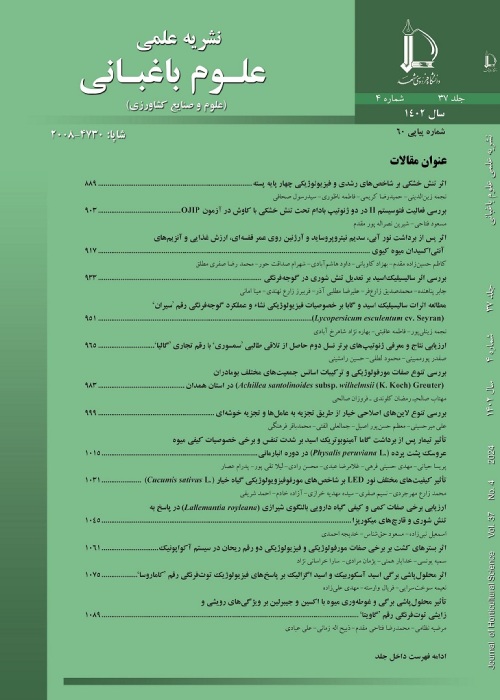The Effect of Heat Shock on Chilling Tolerance in ̔Khatooni Melon’ Seedling (Cucumis melo L.)
Melon, like other members of cucurbitaceae family, is sensitive to cold stress. Applying different cultivation techniques in the nursery can provide some degree of tolerance to environmental stresses in the plants. In the other words, applying stress conditions on plants may cause them to withstand subsequent stresses, this is so called a cross-adaptation or cross-tolerance. For example, Whitaker (1994) showed that cold stress damage can be mitigated by temperature pretreatment. This technique was then used to improve stress tolerance in different plants. In this regard, heat treatment has been used to increase the chilling tolerance in fruits and vegetables. Therefore, in this study, the possibility of increasing cold stress tolerance in melon seedlings using heat shock was investigated.
The experiment was conducted in a completely randomized design (CRD) with three replications and five treatments (including control and spraying with water at temperatures of 20, 45, 50 and 55 °C for 90 seconds) in Faculty of Agriculture of Ilam University in 2019. Heat treatments where used as foliar spray by heated water. After applying different levels of heat treatment and recovery at 24 hours, seedlings were exposed to chilling stress at 3 °C for 6 h in 6 consecutive days. All seedlings were transferred to greenhouse and after 72 hours, the related traits were measured.
Results showed that pre-treated seedlings had higher growth rate than control seedlings at the end of chilling period. Heat shock pretreatment significantly increased the content of chlorophyll, proline and hydrogen peroxide and reduced the amount of malondialdehyde compared to the control. The lowest amount of malondialdehyde (1.14 nmol g-1 fresh weight) was observed in the 50 °C treatment, which was 50% lower than the control. Similar to other environmental stresses, low temperature usually leads ROS production and oxidative stress. Malondialdehyde content is an index to measure membrane lipid peroxidation and its measurement is a criterion of damage to plants in stress conditions. Reduction of malondialdehyde has been reported to increase cell membrane stability and increase stress tolerance in plants. In the present study, heat shock reduced the accumulation of malondialdehyde compared to the control, indicating a decrease in cold effects on the plant. Mei and Song (2010) investigated the effect of heat pretreatment on increasing high temperature tolerance in barley, and reported that using this method by stimulating the synthesis of antioxidant enzymes prevented the increase of malondialdehyde in the plant under heat stress. Therefore, maintaining the membrane structure and decreasing the accumulation of malondialdehyde in melon seedlings under cold conditions indicates an improvement of plant defense responses induced by heat shock. Environmental stresses including cold stress by producing hydrogen peroxide and other free radicals lead to oxidative stress and damage plant cells. Hydrogen peroxide is converted to water by ascorbate peroxidase, peroxide redoxin, glutathione peroxidase and guaiacol peroxidase groups. Therefore, increasing the activity of antioxidant enzymes in plants is one of the most important mechanisms of the plant to cope with stress conditions. In the present study, heat shock pretreatment significantly increased peroxidase (POD) and poly phenol oxidase (PPO) activity and increased the amount of proline and hydrogen peroxide. In this regard, it has been reported that hydrogen peroxide has a dual role in plants and its increase in stress conditions by regulating the production of antioxidant enzymes helps plants to enhance their tolerance to the stress conditions. Our results is in consistent with Ao et al. (2013) report that stated hardening pretreatment of Jatropha curcas seedlings caused to increase the antioxidant enzymes activity, plant glutathione and ascorbate content. The increases in antioxidant enzymes activity by heat shock might be a positive mechanism, which facilitate the scavenging of ROS and induce plant growth and development under chilling stress. These results indicate that antioxidant defense system has a specific role in enhancing plant tolerance to stress conditions and hydrogen peroxide play an important signaling role in plant adaptive responses.
In general, the results showed that heat shock (especially at 50 and 55 oC) caused positive physiological changes in melon seedlings and could increase their tolerance to cold stress conditions.
- حق عضویت دریافتی صرف حمایت از نشریات عضو و نگهداری، تکمیل و توسعه مگیران میشود.
- پرداخت حق اشتراک و دانلود مقالات اجازه بازنشر آن در سایر رسانههای چاپی و دیجیتال را به کاربر نمیدهد.


